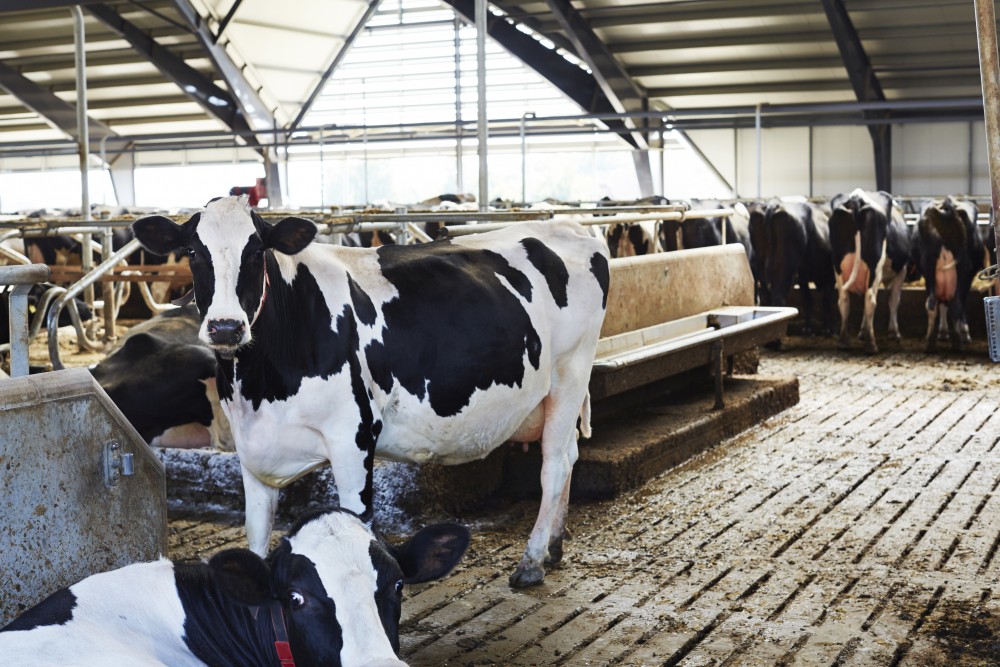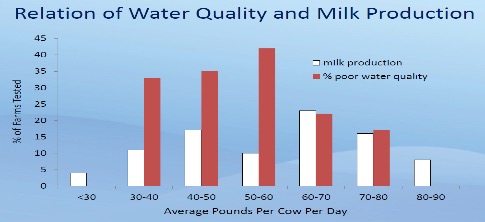The Significance of Water Quality in Livestock

The Significance of Water Quality in Livestock
Water is an essential nutrient which is involved in all basic physiological functions of the body. However, it is important to note that water, relative to other nutrients, is consumed in considerably larger quantities. Therefore, water availability and quality are extremely important for animal health and productivity. Limiting water availability to livestock will depress production rapidly and severely. Poor quality drinking water is often a factor for limited water intake.
Water Intake:
Rations can be perfect on paper but Cows are more sensitive than people are to water quality problems. Besides production, digestion and reproduction problems, some visible signs of water intake problems include: cows lapping at water, blowing bubbles in water, and hovering over the water tank.
Dairy cows need about 4 parts of water to produce 1 part of milk. Therefore, a cow producing 45 Liters of milk per day needs to consume about 180 Liters of water per day. If she eats 50 kg’s of her ration that contains 50% moisture, she will get 25 Liters of water from the ration and will need to actually drink 155 liters of water / day
Table 1. The difference between water intake, water temperatures and milk production:
|
Milk Production / Day In Liters |
Relation Between Water Temperature & Water Intake |
||
|
7 Celsius |
15 Celsius |
24 Celsius |
|
|
Estimated Daily Water Intake In Liters |
|||
|
11 |
72 |
84 |
100 |
|
18 |
84 |
100 |
112 |
|
27 |
96 |
112 |
128 |
|
36 |
112 |
128 |
140 |
|
45 |
128 |
140 |
156 |
Water Quality:
Water quality and temperature will impact the water intake. Quite often the return water of the plate coolers is re-used for drinking water. This makes water treatment even more important, the warm water can be an easy target for bacteria to grow and multiply. The most common water quality problems affecting livestock production include bacterial contamination and high concentrations of minerals, (Iron & Manganese) sulphates, nitrates and nitrites. Poor water quality may have significant impacts on an animal’s production and health.
Why take action?
Micro-organisms thrive in the presence of water & nutrients. Once they have found a suitable surface they attach themselves and multiply. Growth can be rapid with new cells attaching to each other and adding across the surface (biofilm) This will create a woven matrix colony and new organism can now grow and develop (often referred to as “slime”). Nutrients, vaccines and other feed supplements improve growth of these organism in an undesired way.
Research:
Leading the way in providing clean water solutions Dutrion quote Penn State’s research to find out the relation between water quality, water intake and milk production. They tested 174 farms in total.
Common water quality problems:



A closer look on farm solutions:
The stats show that water intake and milk production do matter. However low milk production is not always a result of a water problem. Cows will drink water according to their needs. Therefore, when low milk production is a problem on the farm, low water consumption is usually observed.
1. Is there a water flow problem? Use of water meters on farms is encouraged and the only true way to know how much water cows are consuming. A Dutrion system can then be added to the water supply, in a very simple and cost effective way.
2. Biofilm build up in water lines can also result in lower flow and lower water intake for the animals. Bacteria growth usually happens in dirty water lines filled with biofilm build up over the years. Dutrion is a good way to remove biofilm and prevent biofilm from growing in waterlines.
3. Check the taste and smell of the water. What is your assessment? Here some things that can influence the smell of water:
4. Large storage tanks. (low turnover)
5. Long distribution lines. (Biofilm)
6. Dirty water troughs.
7. High mineral content in water.
8. Use of return water from plate coolers, this is warmer water, that will increase the water intake, but can contain higher bacteria growth if that water is not treated.
9. High mineral content in water.
10. Are calves fed milk replacer using the same water cows are drinking? If yes, how is the calf health and growth? These young animals should the most sensitive to poor quality water. Dutrion is also ideal to clean out and disinfect calf huts, there chlorine dioxide kills cryptosporidium.
11. Check pH of the water. Most water has a pH between 6 and 8.5. Dutrion will work independently with a pH range of 4 – 10.
Alberta Test Farm:
This farm started using Dutrion to eliminate biofilm build up and to improve the production results.
|
Alberta Test Farm: |
|
|
Dairy Farm |
110 Cows |
|
Testing For |
Contagious Mastitis |
|
Robot Milking |
2 Robots (Automatic Back Flush) |
|
Mastitis Report |
Before And After Treatment |
|
Starting Level |
0.8 ppm Dutrion ( 2 Months To Eliminate Biofilm) |
|
Dosing Level |
0.5 ppm Dutrion (For All Water Used) |
|
Extra Facts: |
All Tested Animals Had High SCC (During Monthly Milk Check) |
|
Tested for Staph. Aureus / Strep. Agalactiae / Beta Lactamase |
|
|
Test Results From One Year Un-Treated & Treated With Dutrion |
|
Data Results: No Treatment & Dutrion Treatment.
|
|
Water Untreated |
Water Treated |
Water Treated |
|
|
|
With Dutrion |
With Dutrion |
|
|
2011 |
2012 |
2013 |
|
|
|
|
|
|
Total Cows Tested (All high in SCC) |
59 |
46 |
6 |
|
|
|
|
|
|
Positive cows for Staph. Aureus |
25 |
9 |
0 |
|
% Positive |
42% |
19% |
0% |
|
|
|
|
|
|
Positive cows for Beta Lactamase |
22 |
4 |
0 |
|
% Positive |
37% |
8% |
0% |
|
|
|
|
|
Alberta Test Farm Results: (Please Note, update on test farm completed in 2013):
The farm has installed an extra dosing pump at each robot where they inject another 0.5 ppm to see if they could lower the risk of cross contamination during milking.
The conclusion of this test:
- Lower Somatic Cell Counts (The owner stated a drop in SCC of at least 50,000)
- Overall less cases of chronicle mastitis
- Significant lower amount of cows tested positive for contagious mastitis.
- Cleaner water bowls & troughs
- Overall healthy herd.


